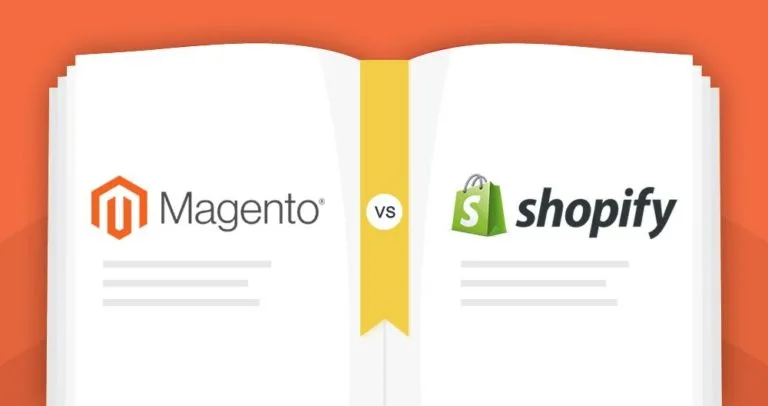Magento vs. Shopify Plus: Which is Better for E-commerce Development?

The significance of robust e-commerce platforms cannot be overstated in this technically driven generation. Among the leading choices for businesses seeking advanced features and scalability are Magento and Shopify Plus. How do you decide which one is the right fit for you?
In this guide, we will meticulously dissect the distinctions between Magento and Shopify Plus, empowering you to make an enlightened decision for the year 2023 and beyond. Our article will thoroughly compare attributes, pricing structures, integration capabilities, security measures, and other pivotal aspects. With this in-depth analysis, you’ll be well-equipped to determine the superior platform tailored to your specific business requirements. But first, let’s start with the basics
What is Magento?
Magento stands as an open-source e-commerce platform, presenting merchants with a versatile array of features to construct, oversee, and personalize their online stores. Tailored to businesses of diverse scales, Magento encompasses three distinct editions:
- Magento Open Source (previously known as Magento Community Edition)
- Magento Commerce (formerly Magento Enterprise Edition)
- Magento Commerce Cloud (formerly Magento Enterprise Cloud Edition)
The gratis rendition, Magento Open Source, provides a foundational platform, while Magento Commerce and Magento Commerce Cloud furnish enhanced capabilities, necessitating an annual subscription for access.
Advantages of Magento
- Flexibility: Magento stands out for its high degree of customization, enabling businesses to align their store seamlessly with their brand identity. Additionally, it offers a diverse range of modules and plugins to augment the functionality of a Magento-powered store.
- Scalability: Built on an open-source architecture, Magento readily adapts to the growth of a business. The platform’s multi-server capabilities empower businesses to manage high traffic volumes and order loads effortlessly.
- Security: Magento prioritizes security, adhering to the highest industry standards. It provides various features like data encryption and password protection to shield customers from fraudulent activities.
- Open Source: As an open-source platform, Magento extends the flexibility for developers and designers to customize the code at their own pace. It also fosters a collaborative community through forums for support and shared knowledge.
- Search Engine Optimization: Magento boasts SEO-friendly features designed to assist businesses in optimizing their online stores for enhanced visibility.
- Magento Connect: Magento Connect serves as a marketplace where businesses can discover and install extensions, themes, and other modules to enhance their Magento store.
- Magento Enterprise vs Magento Commerce: Magento offers two versions, each tailored to different business needs. Although more costly, Magento Enterprise provides additional features like customer segmentation, advanced reporting, and sophisticated marketing tools. On the other hand, Magento Commerce offers a more budget-friendly option with slightly fewer features.
Disadvantages of Magento
- Cost Implications: Implementing Magento Enterprise might pose a significant financial investment, particularly for small businesses. Furthermore, ongoing maintenance expenses are required to ensure the platform’s continued smooth operation.
- Complexity Factor: Magento is a sophisticated platform that demands a certain level of technical proficiency for effective management. Customizations and extensions may necessitate the involvement of developers, potentially incurring additional expenses.
- Performance Challenges: Optimizing performance is an ongoing endeavor with Magento, as it can exhibit sluggishness without regular adjustments. Users of Magento Enterprise have reported occasional performance issues, especially during high traffic or when handling substantial order loads.
- Support Accessibility: Magento lacks direct customer support channels, potentially leading to challenges in problem resolution. Users often turn to community forums or third-party resources for assistance.
What is Shopify Plus?
Shopify Plus emerges as the pinnacle of the Shopify lineage, catering to the unique needs of large-scale and enterprise-level merchants. This elite e-commerce platform boasts an impressive user base, currently hosting over 21,050 websites worldwide. Beyond the numbers, it distinguishes itself by delivering unparalleled scalability, unwavering reliability, top-notch performance, and unmatched flexibility—attributes that surpass the offerings of standard Shopify plans.
Crafted with a strategic focus on accommodating the demands of substantial businesses, Shopify Plus empowers enterprises to navigate the complex landscape of e-commerce with ease. Its robust suite of features and capabilities equips businesses with the tools required to thrive in the digital marketplace.
Advantages of Shopify Plus
- Designed for Scalability and Reliability: Shopify Plus caters specifically to large-scale and enterprise-level merchants, providing them with the scalability, reliability, performance, and flexibility needed to surpass standard Shopify plans. With Shopify Plus, there are no limits on products, sales, or orders, providing ample room for growth.
- Robust Feature Set: It encompasses all the features of Magento Enterprise Edition, including multi-store support, unlimited product catalogs, and advanced shipping options.
- Customizable Themes and Plugins: Shopify Plus offers a diverse selection of customizable themes and plugins, empowering merchants to craft the ideal e-commerce website tailored to their unique needs.
- Extensive Support Network: Merchants on Shopify Plus benefit from an extensive support network, with 24/7 assistance and access to experienced developers to address any issues they may encounter.
- Tailored Checkout Process: Merchants have the flexibility to create a custom checkout process that aligns precisely with their specific requirements.
- Advanced Analytics and Reporting: Shopify Plus equips merchants with sophisticated analytics and reporting tools, enabling data-driven decision-making.
- Integration Capabilities: The platform seamlessly integrates with third-party solutions such as ERP systems and POS systems, enhancing operational efficiency.
- Shopify Plus’s Merchant Success Team: Merchants have access to Shopify Plus’s dedicated support team around the clock, ensuring they receive the assistance they need to succeed.
- Shopify Plus Development: Shopify Plus is the premier choice for businesses seeking a powerful and scalable e-commerce platform. Its advanced features and user-friendly interface accelerate business growth and expansion.
Disadvantages of Shopify Plus
- Cost Differential: Compared to other e-commerce platforms like Magento, Shopify Plus comes at a higher price point.
- Feature Set Comparison: In terms of features, Shopify Plus may not offer the same extensive range as certain competitors, like Magento.
- Fit for Small Enterprises: For small businesses in their initial stages, which may not require the advanced capabilities of Shopify Plus, alternative solutions might be more appropriate.
- Integration Constraints: It’s worth noting that certain third-party integrations could be limited or unavailable within the Shopify Plus ecosystem.
Magento vs. Shopify Plus: A Comparison
These platforms stand out for offering secure, reliable solutions tailored to a diverse array of needs. To make an informed choice in 2023 and beyond, let’s delve into a detailed comparison between Shopify Plus and Magento.
-
Pricing Models
Both Shopify Plus and Magento operate on usage-based pricing models, but a crucial distinction lies in their subscription structures. Magento provides an Enterprise Edition for businesses with high-volume sales and complex customizations. In contrast, Shopify Plus offers a fully hosted solution, negating the need for costly investments in hosting solutions or software licensing. Shopify Plus plans start at $2,000/month, while Magento Enterprise Edition begins at $15,550/year. The ultimate price depends on specific business requirements.
-
Pricing Differentiation
Magento is often deemed more cost-effective for enterprise e-commerce due to its flexible pricing plans and lower upfront costs. Conversely, Shopify Plus presents an attractive option for businesses seeking swift launches with minimal risk. Both platforms deliver comprehensive features and customization potential, making them apt for large-scale operations.
-
Features and Capabilities
In terms of features, Magento offers greater flexibility than Shopify Plus. It empowers users to easily customize their stores, allowing for custom forms and integrations not readily available on Shopify Plus. Additionally, Magento boasts robust marketing tools, including targeted email campaigns, loyalty programs, and seamless integration with Google Analytics & AdWords.
On the flip side, Shopify Plus shines in scalability. Businesses can effortlessly expand their stores to accommodate more customers and products, sans the need for additional development or coding. It also offers an array of built-in payment solutions, streamlining the purchasing process for customers.
-
Capabilities Insight
Both platforms excel at handling large transactions and e-commerce operations. Yet, Magento gains the edge in scalability, customizability, and the availability of marketing and analytics tools. Conversely, Shopify Plus prioritizes user-friendliness, expediting store setup.
The decision between Magento and Shopify Plus hinges on specific business needs. For those craving high customization and potent marketing tools, Magento reigns supreme. However, if scalability and user-friendliness are paramount, Shopify Plus emerges as the preferred option. Regardless of choice, both platforms furnish an array of features and capabilities conducive to business success.
-
Add-ons, Extensions, Integrations, and Apps
Shopify Plus and Magento align closely in terms of add-ons, extensions, integrations, and apps. They both facilitate seamless customization through third-party software integration.
Shopify Plus boasts a robust App Store, providing a vast selection of add-ons that enhance store efficiency and capability. Magento, too, offers a multitude of extensions via the Magento Marketplace. However, users might need more time to pinpoint specific solutions, as the selection may not always meet all needs.
Both platforms provide a wide array of options when it comes to integrations. Shopify Plus offers a diverse selection via its App Store, featuring popular solutions such as MailChimp and Google Analytics. Magento delivers integrations accessible directly from the Magento Marketplace.
Both platforms offer an array of apps for further customization. Shopify Plus grants access to its App Store, housing a wide selection of apps for quick installation. Magento also maintains its own app store, though with a more limited selection compared to Shopify Plus.
In Conclusion
Both platforms offer a rich selection of add-ons, extensions, integrations, and apps. Shopify Plus shines for those prioritizing convenience and swift integration of popular solutions. On the other hand, Magento caters to users seeking niche solutions or extensive customizations due to its broader array of extensions and integrations. The ideal choice hinges on the unique needs of each store owner.
To utilize these additional resources, reach out to professionals like the team at Saffron Tech. We can amplify your store’s features and capabilities, ensuring it operates at peak efficiency and success. Contact us today!




